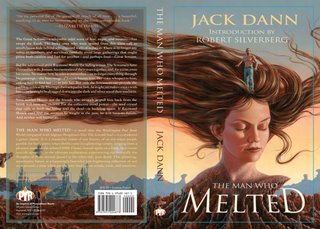Since so many people seem to be interested in my blog entry on How I Promoted My Book, I thought I’d post a few more random thoughts and suggestions about book promotion here.
thought I’d post a few more random thoughts and suggestions about book promotion here.
Keep in mind that there’s no one set way of marketing anything, or we’d all be swilling down New Coke. This is especially true with the book publishing business, which certainly must rank as one of the most bizarre businesses in existence. So your mileage with my suggestions may vary.
Lastly, let’s remember that I have exactly one (1) to my name (obligatory Amazon link here), which has been on the shelves for a grand total of five (5) months. So if Orson Scott Card says one thing and I say another, you might want to, y’know, strongly consider following his advice instead. (Unless he’s talking about politics, religion, or homosexuality. I dug Ender’s Game and Speaker for the Dead like everyone else, but the fellow is a wee bit unhinged.)
And now, once again, we present Dave on Marketing:
Market for the long term. Some people will tell you not to bother with a particular marketing effort because it’s not going to sell any books. But sales or marketing are completely different animals. Marketing is for building reputations, for generating buzz, for spreading the word, and for creating positive impressions, among other things. The ad agencies who spend millions of dollars on Pepsi commercials don’t expect you to run out the door that instant to buy a six-pack; neither should you expect that everyone who reads your blog is going to click straight over to Amazon. The ultimate goal is to boost your writing career, not just the immediate fortunes of one particular book.
Take your book seriously. This was one of the hardest things for me to do after I’d signed my contract with Pyr. Not that I wasn’t utterly serious about the content of the book. But in order for other people to take your book seriously, you have to be serious about the way you market it. You need to be able to stand tall, hold up your book, look a skeptical customer in the eye and say, “I wrote this. It frickin’ rocks. It’s worth your time and money.”
…But don’t take it too seriously. You are marketing a piece of literature, after all, and not a miracle pill to cure leukemia. Many people buy books simply for diversion or entertainment, and they’ll resent an author who believes their book should be read for moral edification and uplift. Hyperbolic statements about the quality of your book (“best thing since sliced bread,” “better than Jesus,” “Foundation is amateurish in comparison”) should be left to your blurbers and reviewers.
Network like a mad fiend. It’s the prime irony of the field: many of us are writers because we’re not comfortable communicating face-to-face. I would much rather sit hunched in the garret scribbling by candlelight than walk around a meeting shaking hands. But the Cranky Lonesome Writer in the Attic routine doesn’t work nearly as well as getting out there and pressing the flesh. And if you’re in science fiction, remember this: no matter how socially awkward you feel, there’s always someone within a stone’s throw who’s ten times worse.
Keep a file of stock promotional materials handy. If you carry around a briefcase or laptop bag, it’s a good idea to keep business cards, review sheets, catalogs, and (of course) a copy of your book with you at all times. You never know when they’ll come in handy. When you’re at home, make sure you have a short bio and synopsis of the novel primed on your computer for quick access. You’re going to be cutting and pasting this stuff a hundred times.
Spread your e-mail address far and wide; answer all of your e-mail. If you’ve got something interesting to say, people will want to contact you. Make sure your e-mail address is easy for them to find. Personally, I don’t bother with the spam protection measures that most people use — the Google and Outlook spam filters work pretty well in concert, and I’d rather wade through a dozen extra pieces of spam than risk losing a single message.
Work with your publisher, not against them. As I mentioned in my last piece, the success or failure of your book in the marketplace largely rests on your publisher’s efforts, not yours. You can certainly add some shine of your own, but as far as marketing and promotion of your book goes, you’re clearly the supporting player. Find out what they have in mind to promote your book. Learn to know where you can offer your assistance, and where it’s better for you to just stay out of the way.
Come up with a nice tagline for your book and keep it handy. You have no idea how often friends, acquaintances, strangers, colleagues, co-workers, etc. will ask you “so what’s your book about?” They don’t want to hear a five-minute exposition about the Three Goblin Warlords in the Kingdom of Vogelvix and the missing Crown of Wobblesparkutron, and how it’s up to a plucky heroine with a band of quirky adventurers to blah blah blah. When someone asks me what Infoquake is about, I simply say, “Dune meets The Wall Street Journal.” It’s short, it’s punchy, and it’s on the book jacket. Sometimes I also use one of the lines from the Barnes & Noble Explorations review of the book that called Infoquake “the love child of Donald Trump and Vernor Vinge.”
In the end, it’s the writing that counts, not the promotion. I’ve read a lot of blogs about book promotion that complain that writers aren’t supposed to be good at promotion, that it’s the job of publishers and publicists to do this crap. And while I don’t entirely agree, I will say this: your primary job is to write. If the books suck, chances are they won’t sell no matter what you do. (And please, no Dan Brown or Terry Goodkind wisecracks here.)
, coming from Pyr January 07.


